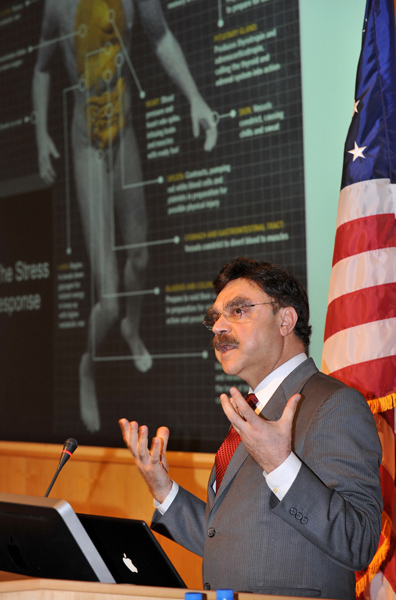Dean of WCMC-Q and Psychiatrist, Dr. Javaid Sheikh, Educates Public About Managing Stress
May 19, 2010

Dr. Javaid Sheikh explains the effects of stress
and related hormones on the brain and body.
Whether we are aware or not, stress affects our life to some degree. When it is extreme and prolonged, stress can affect our physical and mental health and even the health of the people around us. At the latest installment in WCMC-Q’s Medicine and U lecture series, Dr. Javaid Sheikh, dean of the medical college and internationally renowned psychiatric researcher, gave a comprehensive presentation about stress, its causes and its management.
“Stress is a universal experience,” Dr. Sheikh said. “It is the interplay of external forces and internal forces, which is hard to define because of its varying circumstances, but easy to feel.”
To explore the causes of stress, Dr. Sheikh first described its biological and evolutionary basis, in terms of how it affects, and is propagated by different parts of the brain, and how it affects the nervous system and organs of the body.
“Acute fear is associated with the fight, flight or freeze response to a real or perceived threat,” Dr. Sheikh explained. “An extreme stress response manifests physically, emotionally, cognitively and behaviorally.”
Dr. Sheikh explained a major intersection of several parts of the brain that play critical roles in stress—effects of the signals and hormones released by these brain regions can create a continuous loop of activity in the brain that affects other organs. This interplay can be good as it encourages activity and is fed by and feeds motivation around projects.
“There is such a thing as good stress; however, after a certain point, this nervous activity becomes extreme—this is when stress becomes distress,” Dr. Sheikh said.
How can you tell when stress has become distress? Dr. Sheikh discussed symptoms that signal its negative effects, including: memory problems, poor judgment, moodiness, irritability, overwhelming fear, aches, pains, nausea, lowered immunity, eating too much or too little, and changes in sleep patterns.
Dr. Sheikh also discussed the risk factors for experiencing more stress in life, including genetic factors, early life stress, vulnerable life stages, serious medical disorders and environmental factors such as loss of a loved one, divorce and job-related stressors.
“The good news is, there are many things you can do to keep stress at a manageable level in your life and even make it work for you,” he said.

Stress is a factor in everyone's life, Dr. Sheikh explained, and to a
certain degree it energizes and motivates--after a certain point,
however, it can be detrimental and must be managed.
Regular exercise, Dr. Sheikh explained, is probably the single most important stress buster—taking a walk or stretching for a few minutes during the day will do more to boost energy and alleviate stress than another cup of coffee, he said.
Additionally, he recommended a balanced diet, a regular sleep schedule, a network of supportive friends and family members, and enjoyable hobbies and learning opportunities that break up the monotony of modern, busy lives.
At times, he said, medical intervention may be necessary—as in the case of chronic stress that is both extreme and self-perpetuating based on a person’s engrained responses to their environment. He discussed different types of drugs and how they work in the brain to alleviate this extreme situation.
In the end, Dr. Sheikh explained, stress is normal and the outcome is often determined by our response—we can grow through stress or experience distress, which may have negative prolonged consequences physically, mentally and socially.
“With the increased understanding of neurobiology of fear circuits, we can begin to map fear and anxiety within the brain more accurately,” Dr. Sheikh said. “Genetics plays an important role here as well, and, overall, we’re making great progress in understanding how to manage stress and prevent stress and anxiety disorders.”
By Emily Alp
